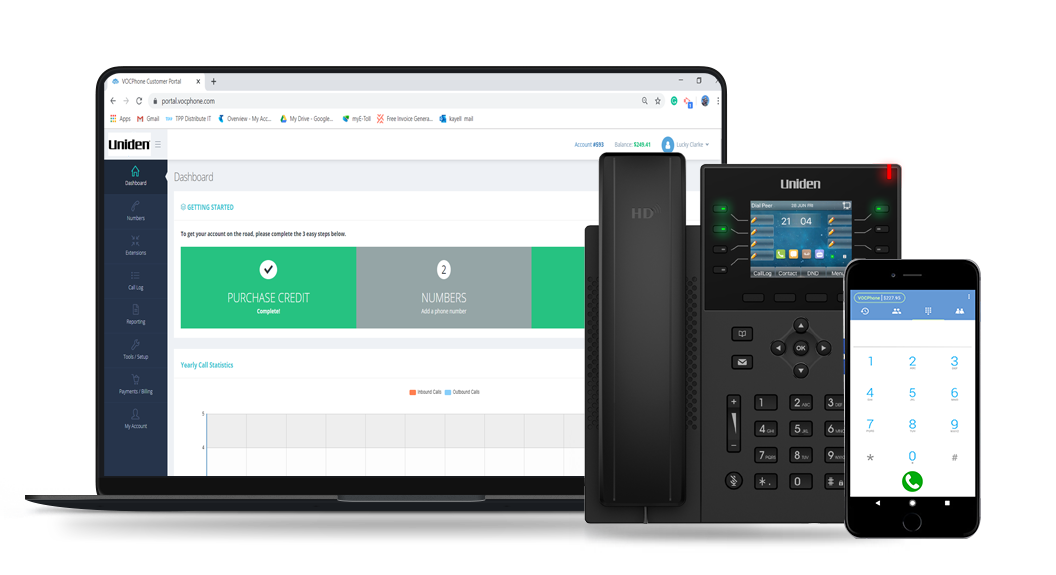
Elevate service delivery with unified communications in healthcare
Unified communications play an important role in the healthcare industry and the right cloud-based phone can make all the difference in service delivery and patient care.

Unified communications play an important role in the healthcare industry and the right cloud-based phone can make all the difference in service delivery and patient care.
Delivering high-quality services to patients is an important part of any healthcare facility. With 83% of companies losing customers based on communication issues, having unified communications (UC) in your healthcare facility can help you establish better communication. One way to do this is through cloud-based phone systems for healthcare.
By consolidating voice, video, messaging, and data into a single platform, UC removes the need for disparate systems and enables information sharing and coordinated care delivery to patients. Healthcare professionals can also communicate seamlessly with each other to share critical patient information in real time and address any urgent issues promptly.
Your patients also expect seamless switching between communication channels with 86% saying that cohesive support is important to their experience. As healthcare professionals, unified communications in healthcare through cloud-based solutions can help improve your service delivery and patient outcomes.

Unified communications facilitate real-time communication and collaboration among your healthcare professionals. This makes it much simpler for them to coordinate patient care, share important patient information, and make decisions about intervention faster, leading to better patient outcomes.
Unified communications give healthcare providers the ability to leverage multiple communication channels. From video conferencing to voicemail-to-email, and messaging, you have the necessary tools and features to engage with patients effectively, provide timely updates, and build trust.
There are many underserved locations across Australia with limited healthcare access. Unified communications can help bridge this gap and improve healthcare access. With cloud-based phone systems, you can remotely monitor patients, offer virtual consultations, and deliver care without hassle.
Healthcare professionals need to be able to access important information at all times and unified communications can help. From providing care more efficiently to enhancing responsiveness, the right cloud-based phone system can offer the right solutions to help improve your communication.
Features like call queuing, call recording, call forwarding, and call routing can optimise call management and patient interactions.
From voicemails to emails and messaging, cloud phones consolidate everything so you have your patient communications in a single location.
Cloud-based phones have automatic updates which means you get the latest features and security patches for improving data security.
Healthcare professionals can access any communication features needed no matter where they are, improving flexibility and mobility.
Cloud phones offer collaboration features like video conferencing, voicemail-to-email, and instant messaging for better communication.
Uniden offers unified communication solutions through cloud-based phone systems designed for Australian businesses—including those in the healthcare industry. Our deep understanding of the challenges faced by healthcare providers gives us the edge in providing a solution that improves patient care and service delivery.
Speak to our team and get more information about our 40+ free features and find out how they help you streamline healthcare operations, improve staff productivity, and deliver exceptional patient experiences.

Unlock the full potential of your healthcare facility with unified communications that drive service delivery.
In critical situations, unified communications (UC) play a vital role in facilitating rapid communication and coordination among healthcare teams. UC solutions enable immediate information sharing, efficient resource allocation, and seamless care transitions, ensuring timely response and potentially saving lives.
Successful adoption of unified communications in healthcare requires careful planning and employee training. Healthcare facilities should provide comprehensive training programmes to ensure that staff members understand the features and capabilities of the UC platform, as well as best practices for effective communication and collaboration.
Ongoing support and training resources should also be made available to reinforce proper usage and address any concerns or challenges that may arise.
Measuring the ROI of unified communications can be challenging due to the diverse benefits and impacts on patient care, operational efficiency, and staff productivity. However, facilities can track and analyse metrics such as reduced communication costs, improved staff mobility and responsiveness, decreased hospital readmission rates, increased patient satisfaction scores, and reduced administrative overhead.
Unified communications play a crucial role in supporting continuity of care and seamless care transitions within the healthcare ecosystem. By enabling real-time communication and collaboration among healthcare professionals across different settings (e.g., hospitals, clinics, home care), UC solutions ensure that patient information is accurately and securely shared during care transitions.
It can enhance patient engagement and education by providing various channels for healthcare providers to communicate with patients effectively. Video conferencing capabilities allow for virtual consultations, enabling patients to receive care from the comfort of their homes or remote locations. Secure messaging and email features can be used to send appointment reminders, educational materials, and post-visit instructions.